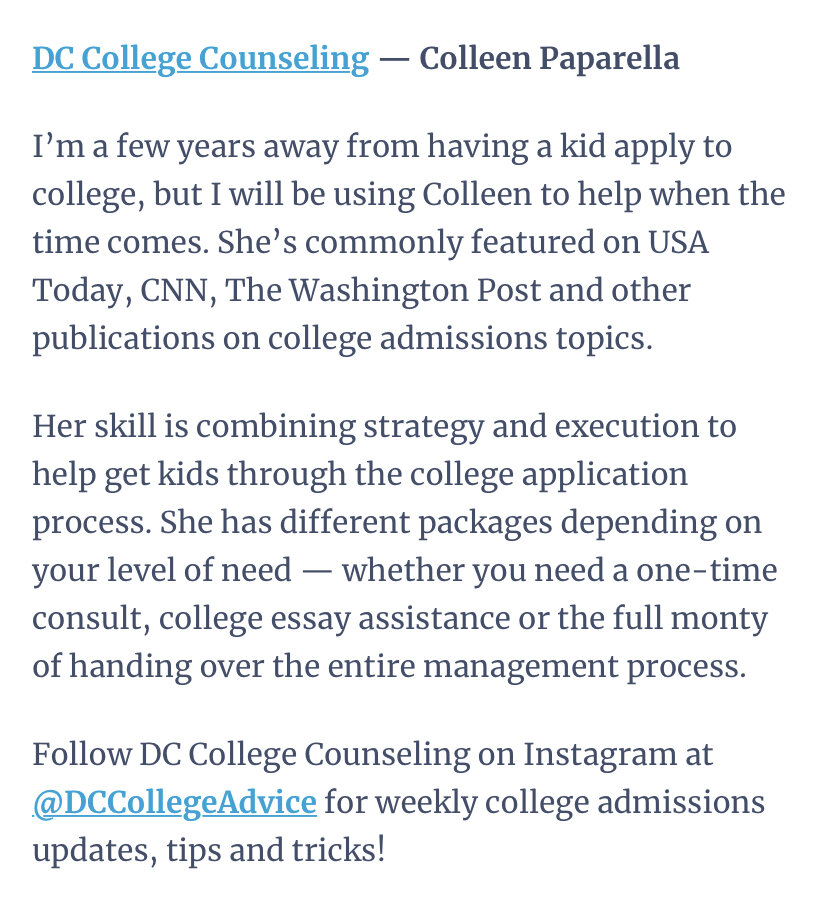BIGGEST COLLEGE-RELATED NEWS OF THE WEEK
FAIRFAX COUNTY PUBLIC SCHOOLS VIRTUAL COLLEGE WEEK
Fairfax County Public Schools are continuing with a virtual approach to college fairs this fall. They will have live virtual sessions from Monday, October 18 - Thursday, October 21. There will be three sessions each evening, and students should take a look at the schedule to see which sessions they may be interested in attending - there are sessions available for everyone from ninth graders to high school seniors.
COVID-19 JOB MARKET BOUNCES BACK
As you may have noticed from all of the “help wanted” signs, the job market is coming back as more people are vaccinated. While class of 2020 students graduated into a very difficult market, the class of 2021 is finding a much easier time when it comes to the job search. On campus recruiting has begun again at several schools, helping to connect these students with employers. Part-time work and internships have also been picking up.
If you are (or you know!) a local college student looking for an internship, we are hiring! Interested students should send us their resumes via email.
FIRST VARSITY BLUES TRIAL WRAPS
Lawyers delivered the closing arguments in the first Varsity Blues trial on Wednesday, and the jury is deliberating as we write this blog. The lawyers for the two fathers facing trial argued that they did not know the methods that Rick Singer was using, and believed they were making legitimate donations. We’ll be watching closely for the outcome of this trial, which will likely set precedent for the upcoming trials of parents and others involved in the scandal.
BEST ARTICLES OF THE WEEK
We liked this post from Akil Bello (featured in the Varsity Blues documentary!) a lot, and wanted to share it because it has a lot of helpful information in terms of making the decision to take a standardized test. However, there were two pieces of information from Akil that don’t align with the advice that we’d give students, so we want to also provide a clarification. Keep in mind that all advice is subjective and dependent on many factors such as geographic location, etc.!
We believe that students should take their first SAT/ACT during the fall of junior year if possible, and finish testing by the end of junior year. This empowers them to make final decisions about their college list after they know their scores. Otherwise, they'd be making these decisions based on guesses about what their scores might look like. That can lead to overshooting or undershooting in terms of selectivity, and we prefer to work with actual numbers.
We really agreed with everything in the test prep section and found that to be very valuable. For example, the 6-8 week span and the potential for improvement. The one part we didn't agree with is about potentially making the choice NOT to prep if a student scores above the 90th percentile with no prep after the fall of 11th grade. This is accurate from a national standpoint, but not at the schools to which most of our students hope to attend. 90th percentile scores are not going to cut it at their schools of choice - even UVA's 25th-75th% range reflects the 97th-99th percentile of ACT-takers. This means that only a quarter of UVA's admitted students who sent ACT scores came in lower than the 97th percentile (depressing, right?). So don't be lulled into a false sense of test prep security if you reach the 90th percentile and hope to attend a highly selective school.
When the College Board got rid of the SAT II earlier this year, many of us speculated that AP exams would come to be more significant in the college admissions process. This article in Psychology Today explores why that may not be such a great idea for students. In fact, the way that many AP classes are taught - “to the test,” to prepare students to take the AP exam - is the exact opposite of how many actual college classes are designed. In college, it will be far more important that students learn to think critically than that they memorize facts (that they promptly forget!) in order to score well on a standardized exam.
While we agree with much of what this article says, the fact is that for many students, AP classes are part of setting themselves up for success in the college process. And until schools stop offering them as part of the curriculum (as many private schools have!), it is important for students to take a rigorous curriculum based on what is offered by their high school. So we are sorry to say that our general advice is, take the AP class! Of course, this is also particular to the student, and there are certainly students for whom the cons outweigh the pros when it comes to managing an AP course load.
While we like to think that the work we do is pretty important, we wouldn’t have said it was a “matter of life and death” - until this interview! Angus Deaton, a Nobel prize winner and professor emeritus at Princeton, suggests that four-year college graduates are less likely than those who did not attend college to succumb to “deaths of despair” - suicides, drug overdoses, and the like. The gap between people with a bachelor’s degree and those without when it comes to these tragedies is only growing in the United States.
OFFICE HAPPENINGS
I was so honored and excited to co-host a roundtable session on “The Joys and Challenges of Being a Female Entrepreneur” today for IECA, the professional organization to which Shannon and I belong. Here’s a snapshot of some of the attendees! I’m on the top row to the left with my co-host, Dr. Pat Smith, to my right.
October is National Women’s Small Business Month, and this roundtable was a great way to celebrate. It was heartwarming to see how all of these individual consultants run very different businesses, yet we all care immensely about providing our families with the best possible experience.
Have a great weekend!

















